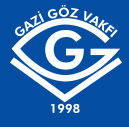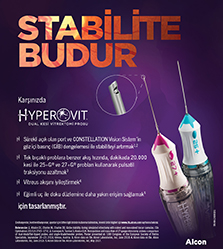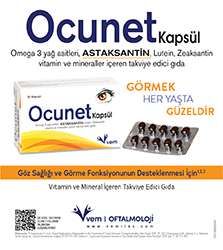Retina-Vitreous
2013 , Vol 21 , Num 3
Is Pharmacotherapy Effective for the Treatment of Proliferative Vitreoretinopathy?
M.D. Associate Professor, Special Dunya Eye Hospital, Etiler-İstanbul/TURKEY
Proliferative vitreoretinopathy (PVR) is a wound healing process, which is characterized by membrane formation on both surfaces of the retina and in the vitreus as a result of migration and proliferation of cells in these areas. Contraction of formed membranes causes traction retinal detachment (RD) in the first stage, which in time may result in reopening of preexisting breaks; or new breaks form and rhegmatogenous RD component may be added to the scene. PVR is the most frequent cause of failure after RD surgery. Stages in the pathogenesis of PVR in order are, inflammation with activation and proliferation of cells, extracellular matrix formation and remodeling, and contraction. Each stage is a complicated process, in which various molecules and cells play roles. Although, the primary treatment of PVR is a well-performed surgery; multiple phamacological agents can be use to prevent PVR formation or prevent its recurrence as adjuvants to surgery. Antiinflammatory, antiproliferative drugs, and agents that inhibit formation and contraction of extracellular matrix are some of them. As the importance of molecules that play roles in every step of PVR ptahogenesis and genetic predispositions get clear, and as the drugs can be given more efficiently and for longer time, the efficiency of pharmacotherapy of PVR will be more effective. Investigative studies to develop effective drugs for the prophylaxis and treatment PVR without side effects, that will be easily used for long times are currently ongoing. Especially, the prophylaxis of PVR seems to be possible with the current pharmacotherapy options available. It is demonstrated that postoperative inflammation is decreased with the use of antiinflammatory agents. Intraoperative infusion of low molecular weight heparin and 5-fluorouracil is clinically found effective in the prevention of PVR in eyes with high risk for PVR development. The studies that will show the efficacy of isotretinoin in the prophylaxis and treatment of PVR will be announced in the near future, which seem to be hopeful. Because the pathogenesis of PVR is complicated, combined therapies which are effective for its every stage are expected to be more successful for the effective pharmacotherapy of PVR.
Keywords :
Proliferative vitreoretinopathy, retinal detachment, pharmacotherapy, antiinflammation, antiproliferation




